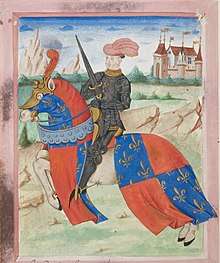Charles I d'Albret
Charles I d'Albret (December 1368 – 25 October 1415) was Constable of France from 1402 until 1411, and again from 1413 until 1415. He was also the co-commander of the French army at the Battle of Agincourt where he was killed by the English forces led by King Henry V.
| Charles I d'Albret | |
|---|---|
 | |

Biography
Charles was born into an old Gascon family, the son of Arnaud, Lord of Albret, and Margaret de Bourbon.[1][2] He served under Bertrand du Guesclin as a young man and fought at the battle of Roosebeke.[2] He was made the constable of France by Charles VI in 1403, but dismissed when the Burgundian faction gained power at court.[2] He was restored to his office in 1413 when the Armagnac faction regained power.[2] An important figure at the French court, he is the subject of two of Christine de Pizan's Autres Ballades (#2 and #3).[3]
Although nominal commander of the French army in the Agincourt campaign together with Marshal Boucicaut, the two professional soldiers could not exercise effective control over the higher-ranking French nobles on the day of the battle. Constable d'Albret was killed at Agincourt during the battle on 25 October 1415, against the English troops led by King Henry V.[2] He was interred at the Friary church in Hesdin.[2]
Family
He married, Marie de Sully,[4] daughter of Louis de Sully and Isabel de Craon, on 27 January 1400 and had issue:
- Jeanne d'Albret (1403–1433), married in 1422 John I, Count of Foix.[5] She was his second wife; the only one of his three wives who bore him issue.
- Charles II d'Albret (1407–1471),[1] married Anne of Armagnac (born 1402), the daughter of Bernard VII of Armagnac, Count of Charolais and Bonne of Berry, by whom he had seven children.
- Guillaume d'Albret (d. 1429), Lord of Orval
- Jean d'Albret
- Catherine d'Albret, married Charles de Montagu (1363–1409)[6]
In culture
Constable Charles d'Albret plays a significant role in William Shakespeare's play Henry V, as one of the leading enemies of the English. As he does not die on stage, his death is portrayed in very different ways in film adaptations of the play. Constable d'Albret was portrayed by Leo Genn in the 1944 film Henry V. The film sets up d'Albret as the most military worthy of the French warriors, but with a sneering manner and a "fierce and inhuman appearance" in black armour with a pointed visor.[7] He is killed in single combat with Henry, played by Laurence Olivier. His distinctive black armour is later taken and worn by Ancient Pistol.
He is played by Richard Easton in the 1989 film Henry V. Constable d'Albret's death at Agincourt is vividly depicted in the film which starred Kenneth Branagh in the title role. He is rescued mortally wounded from the muddy battlefield, only to die in shamed despair among other shocked French aristocrats.
In the 2012 TV film of Henry V, concluding the series The Hollow Crown, he is played by Maxime Lefrancois. His death is portrayed in an unheroic light. In a wood away from the main action, he stabs the Duke of York in the back during the final stages of the conflict, only to be shot in the back by a longbowman as he prepares to kill the only witness, a young page. The page is later revealed to be the Chorus, remembering the events as an old man after the disasters of Henry VI's reign.
Ancestry
| Ancestors of Charles I d'Albret | |||||||||||||||||||||||||||||||||||||||||||||||||||||||||||||||||||||||||||||||||||||||||||||||||||||||||||||||||||||||||||||||||||||||||||||||||||||||||||||||||||||||||||||||||||||||||||||||||||||||||||||||||||||||||||||||||||||||||||||||||||||||||||||||||||||||||
|---|---|---|---|---|---|---|---|---|---|---|---|---|---|---|---|---|---|---|---|---|---|---|---|---|---|---|---|---|---|---|---|---|---|---|---|---|---|---|---|---|---|---|---|---|---|---|---|---|---|---|---|---|---|---|---|---|---|---|---|---|---|---|---|---|---|---|---|---|---|---|---|---|---|---|---|---|---|---|---|---|---|---|---|---|---|---|---|---|---|---|---|---|---|---|---|---|---|---|---|---|---|---|---|---|---|---|---|---|---|---|---|---|---|---|---|---|---|---|---|---|---|---|---|---|---|---|---|---|---|---|---|---|---|---|---|---|---|---|---|---|---|---|---|---|---|---|---|---|---|---|---|---|---|---|---|---|---|---|---|---|---|---|---|---|---|---|---|---|---|---|---|---|---|---|---|---|---|---|---|---|---|---|---|---|---|---|---|---|---|---|---|---|---|---|---|---|---|---|---|---|---|---|---|---|---|---|---|---|---|---|---|---|---|---|---|---|---|---|---|---|---|---|---|---|---|---|---|---|---|---|---|---|---|---|---|---|---|---|---|---|---|---|---|---|---|---|---|---|---|---|---|---|---|---|---|---|---|---|---|---|---|---|---|---|---|
| |||||||||||||||||||||||||||||||||||||||||||||||||||||||||||||||||||||||||||||||||||||||||||||||||||||||||||||||||||||||||||||||||||||||||||||||||||||||||||||||||||||||||||||||||||||||||||||||||||||||||||||||||||||||||||||||||||||||||||||||||||||||||||||||||||||||||
See also
References
- Wagner 2006, p. 5.
- Bradbury 2004, p. 6.
- Willard 1998, p. 3-15.
- Galand 2005, p. 289.
- Biu 2002, p. 453.
- Chattaway 2006, p. 11.
- Loehlin 2000, p. 46.
Bibliography
- Biu, Hélène (2002). "Du panégyrique à l'histoire : l'archiviste Michel de Bernis, chroniqueur des comtes de Foix (1445)". Bibliothèque de l'École des chartes (in French).CS1 maint: ref=harv (link)
- Bradbury, Jim (2004). The Routledge Companion to Medieval Warfare. Routledge.CS1 maint: ref=harv (link)
- Chattaway, Carol Mary (2006). The Order of the Golden Tree: The Gift-giving Objectives of Duke Philip the Bold of Burgundy. Isd.CS1 maint: ref=harv (link)
- Courroux, Pierre (2017). "How to become Armagnac? The case of Charles I d'Albret, 1368–1415". French History. 31 (2): 133–151. doi:10.1093/fh/crx017.CS1 maint: ref=harv (link)
- Galand, Gérard (2005). Les seigneurs de Châteauneuf-sur-Sarthe en Anjou (in French). Cheminements.CS1 maint: ref=harv (link)
- Loehlin, James (2000). Shakespeare in Performance: Henry V. Manchester University Press.CS1 maint: ref=harv (link)
- Wagner, John A., ed. (2006). Encyclopedia of the Hundred Years War. Greenwood Press. Missing or empty
|title=(help)CS1 maint: ref=harv (link) - Willard, Charity Cannon (1998). "Christine on the Art of Warfare". In Desmond, Marilynn (ed.). Christine de Pizan and the Categories of Difference. University of Minnesota Press.CS1 maint: ref=harv (link)
| French nobility | ||
|---|---|---|
| Preceded by Arnaud Amanieu |
Count of Dreux 1401–1415 |
Succeeded by Charles II |
| Political offices | ||
| Preceded by Louis de Sancerre |
Constable of France (Armagnac) 1404–1415 Disputed by Waleran III, Count of Ligny (1411–1413) |
Succeeded by Bernard VII of Armagnac |